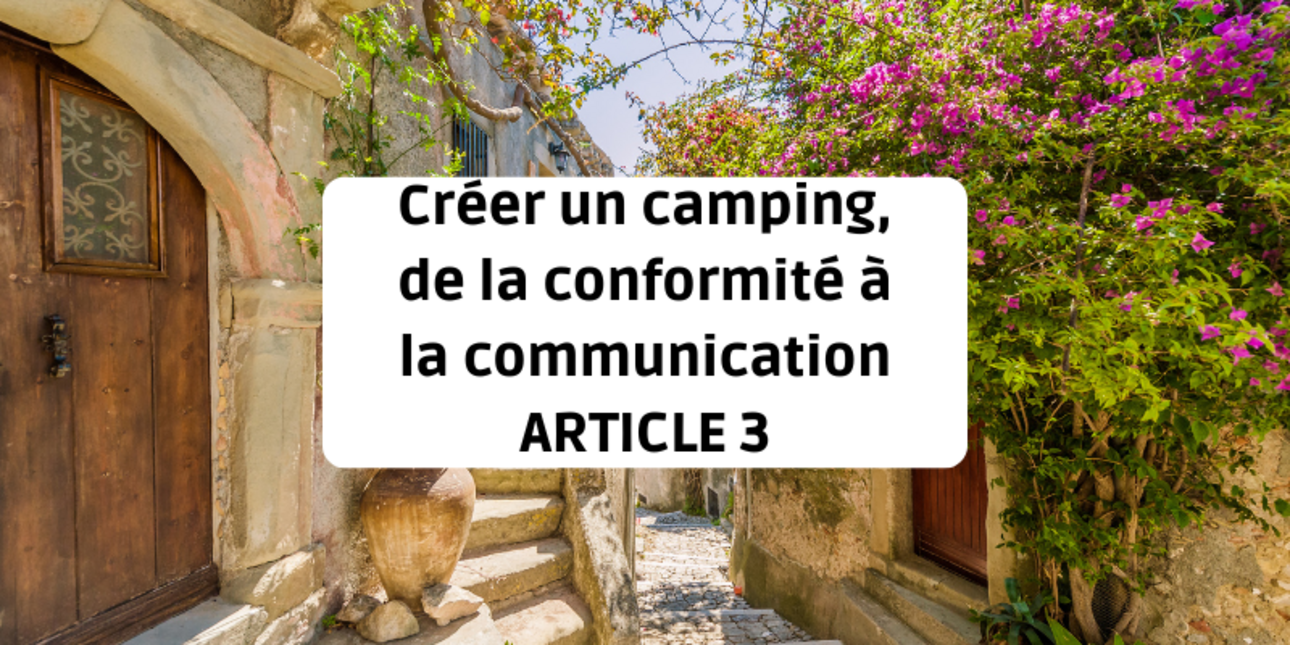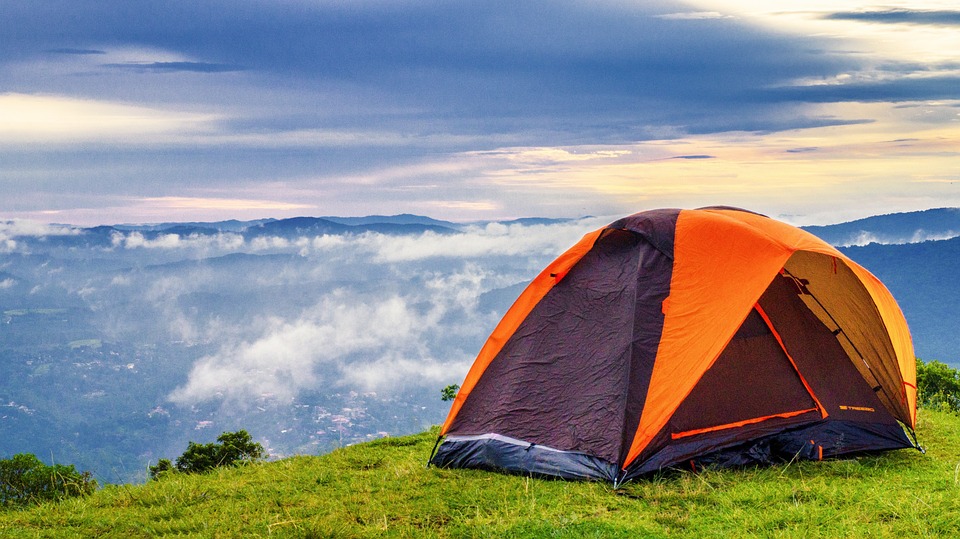
After looking at the big picture the necessary preparations and quality services to be offered when setting up a campsite in the middle of nature, it's time to explore the company's operational management and communications strategy in more detail. We'll cover and analyse the small, essential aspects of day-to-day management, including legal compliance, authorisations and administrative procedures. We'll then move on to the communication strategy, looking at how to create and study an effective plan, manage bookings, integrate into networks and franchises, and build customer loyalty to ensure the success of the project over several years.

The authorisations and permits required to open a campsite in France are subject to strict regulations, designed to ensure legal compliance and the safety of facilities. Here is an overview of the different permits and authorisations required, and the associated procedures:
Declaration at the town hall :
The first step in opening a campsite is to make a declaration at the town hall, in accordance with the following regulations Article R421-23 of the Town Planning Code. This declaration is compulsory for campsites that do not require planning permission. The deadline for analysis is one month from the date of receipt of the application  if no response is received within 3 to 5 months, depending on the situation, this constitutes tacit approval.
if no response is received within 3 to 5 months, depending on the situation, this constitutes tacit approval.
If the project concerns the creation or extension of a campsite likely to accommodate more than 20 people or more than 6 leisure accommodation units (caravans, tents, etc.), planning permission for the area is required. In accordance with Article R421-19 of the Town Planning Code, the manager must submit a permit application to the town hall, which takes 3 months to process. Obtaining this permit is important to ensure compliance with current standards and regulations.
Once the work to develop the campsite has been completed, a declaration of completion of the work must be sent to the town hall, in agreement with the owner article R.443-8 of the French Town Planning Code. This declaration is essential before starting or continuing to operate the campsite. If the campsite manager has obtained an amending permit or has complied with a formal notice from the public authorities, he or she has no choice but to comply with this obligation by suspending the rentals made available. Failure to comply with this provision exposes the manager to legal and financial penalties.
Opening a campsite therefore requires meticulous planning and a certain amount of attention, taking into account the specific authorisations and permits required at each stage of the process, in order to guarantee the legality and safety of the establishment.
As well as obtaining the necessary authorisations and permits, opening a campsite involves a series of crucial administrative formalities. These formalities are essential to ensure legal compliance and the smooth running of the establishment. Here is an overview of the administrative steps to consider:

Before going ahead with this project, the manager must register with the Chamber of Commerce or the Chamber of Trades. This defines the legal framework for the business. What's more, obtaining an identification number from the CFE of the Chamber of Commerce and Industry (CCI) in your department of the region is essential to establish formal identification of the business.
The publication of a legal announcement is an important action in the process of opening a campsite. The purpose of this formality is to inform the public and the relevant authorities of the creation of the establishment over a given period. The legal announcement must declare and contain specific information about the campsite, such as its status, location, outdoor activities or leisure activities, and the owner's surname.
In addition to the administrative procedures mentioned above, the campsite operator must comply with the legal regulations in force, depending on the reception capacity and types of pitch offered. There are a number of aspects to this, such as hygiene and safety of facilities, responsibility for waste management and tourist tax.
3. Establishments open to the public (ERP)

ERP are places or buildings that receive customers, members of the public or users, whether free of charge or for a fee.
As establishments open to the public (ERP), campsites are subject to rigorous infrastructure safety and accessibility standards. Classified in category R5 according to their capacity, campsites must comply with specific rules to ensure the protection of people staying on site. Fire safety systems such as smoke extraction, emergency lighting and fire detection are essential investments. In addition, an evacuation plan, a fire alarm system and first aid training for staff are required. Fittings and equipment must also comply with accessibility standards and conditions, including access ramps, adapted sanitary facilities and appropriate lighting. The legal classification by category and type is proposed and declared by the owner or operator, then validated by the departmental consultative committee on safety and accessibility (CCDSA). Before opening a rural campsite on the day, it is crucial to obtain an operating permit from the town hall, comply with local and national regulations, and ensure compliance with fire safety and accessibility standards in order to make the campsite available to customers. Specific information on local requirements can be obtained by contacting the local council.
To put in place an effective communications plan for your rural campsite, start by clearly defining your objectives and your positioning, whether you want to attract new campers or investors, promote specific facilities or  increase local awareness of your heritage. Identify your target audience, understand their needs and select key messages that highlight the unique aspects of your campsite. Choose communication channels adapted to your audience, such as local posters, advertisements in community newspapers, social media with attractive visuals, development of an informative website and partnerships with local tourist offices. Activate your presence at local events, partner with local businesses and offer seasonal specials to attract early campers. This holistic approach will help you to choose, create and successfully implement effective communications to promote the rural camping environment as a dream destination, depending on the area in which you are located.
increase local awareness of your heritage. Identify your target audience, understand their needs and select key messages that highlight the unique aspects of your campsite. Choose communication channels adapted to your audience, such as local posters, advertisements in community newspapers, social media with attractive visuals, development of an informative website and partnerships with local tourist offices. Activate your presence at local events, partner with local businesses and offer seasonal specials to attract early campers. This holistic approach will help you to choose, create and successfully implement effective communications to promote the rural camping environment as a dream destination, depending on the area in which you are located.

Reservation management is a strategic and communication asset for a successful tourism business. To optimise this process, it is essential to invest in a user-friendly and efficient online booking system. A comprehensive, well-designed website with an intuitive booking platform simplifies the concept for potential customers. By highlighting availability in real time, special offers according to budget, and different accommodation options (beachfront location, children's play area, etc.), the website becomes a powerful tool for attracting and converting visitors into bookings.
Transparent communication of rates, cancellation policies and the services included in the booking increases customer confidence. In addition, skilful use of social networks and newsletters helps to encourage loyalty and advance planning of average customer attendance. By integrating these strategies, rural campsite owners can maximise the efficiency of their booking management, optimise the occupancy of their facilities and buildings, and boost their own visibility in a highly competitive market.
Joining a campsite network or opting for a franchise is a sensible strategy for rural entrepreneurs, and there are several examples across the country that illustrate this approach successfully. Integrated chains, such as the European Camping Group (ECG), Huttopia & Cie, MS Vacances, Pierre Houé Et Associés, etc., are just a few examples(Capfun), Vacanceselect, and others, offer new owners access to comfortable communication that is already well established and targeted. These circuits often have attractive websites, national advertising campaigns and centralised booking platforms or applications, making it easier for entrepreneurs to enter the market naturally.
On the other hand, franchise chains such as Flower Campings, Camping Paradis, Yelloh ! Village, demonstrate how franchising can offer a turnkey solution, with pre-established communication models and national advertising campaigns. Owners of these franchises also benefit from the ongoing support and training provided by the franchise.
For those who prefer a more voluntary approach, groupings and chains such as Indés Campings, French Time, and Sunêlia offer affiliation models. These networks are mainly aimed at established campsites, offering them the opportunity to benefit from shared marketing resources while retaining a degree of independence.
By opting for one of these options, owners of rural campsites can harness the power of the networks already in place, guaranteeing effective communication and increased visibility across the territory while retaining the flexibility to adapt their offering and costs to specific local needs.

To build customer loyalty at a rural campsite, an approach based on personalisation and social involvement is essential. By offering a number of warm, individualised services, campsite owners can forge close links with their customers. By organising regular events and introducing a loyalty programme with exclusive benefits, owners strengthen the sense of community and encourage long-term loyalty.
Communication plays a key role in building loyalty. Owners keep in touch with customers through personalised newsletters, keeping them informed of new products and upcoming events. By frequently asking for feedback, owners demonstrate a commitment to customer satisfaction.
With special privileges (special offers, early bookings, discounts for loyal customers...), local collaboration with partners, and promotion on social networks, rural campsite owners seek out and attract new customers while building lasting relationships and a positive reputation for the long-term success of their establishment.
Effective operational management and a well thought-out communication strategy are essential to the success of a rural campsite. Ensuring legal and administrative compliance, as well as developing effective communication, are crucial aspects of day-to-day project management. As with planning, it's important to remain flexible and adapt to potential challenges. It's also a good idea to call on professionals in the field to help you benefit from their expertise and ensure the success of your business. By putting these plans into practice, you'll be able to guarantee the smooth running of the campsite and attract a loyal clientele, ensuring the long-term success of your business.